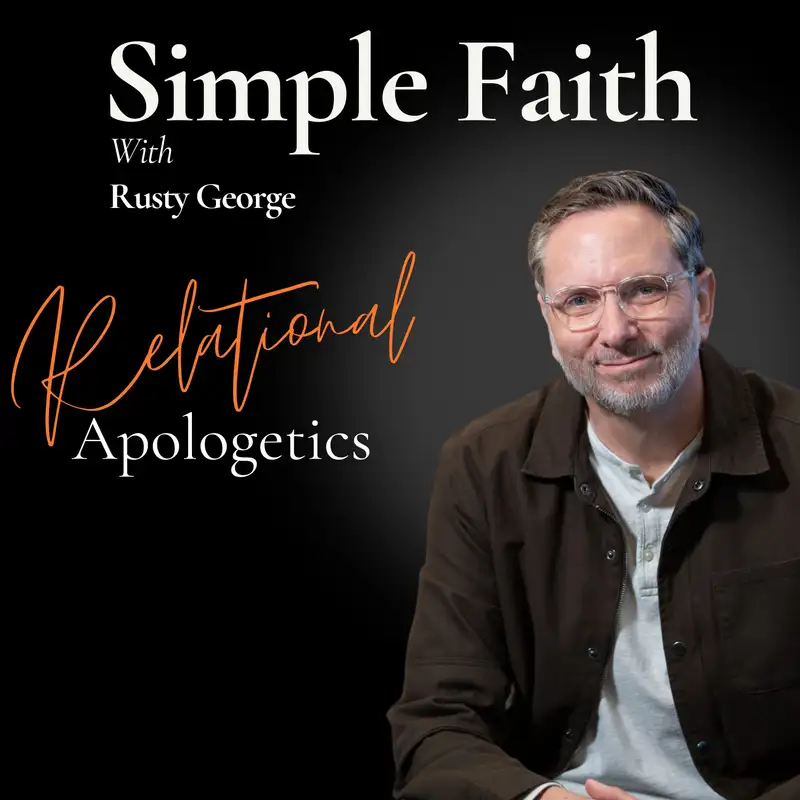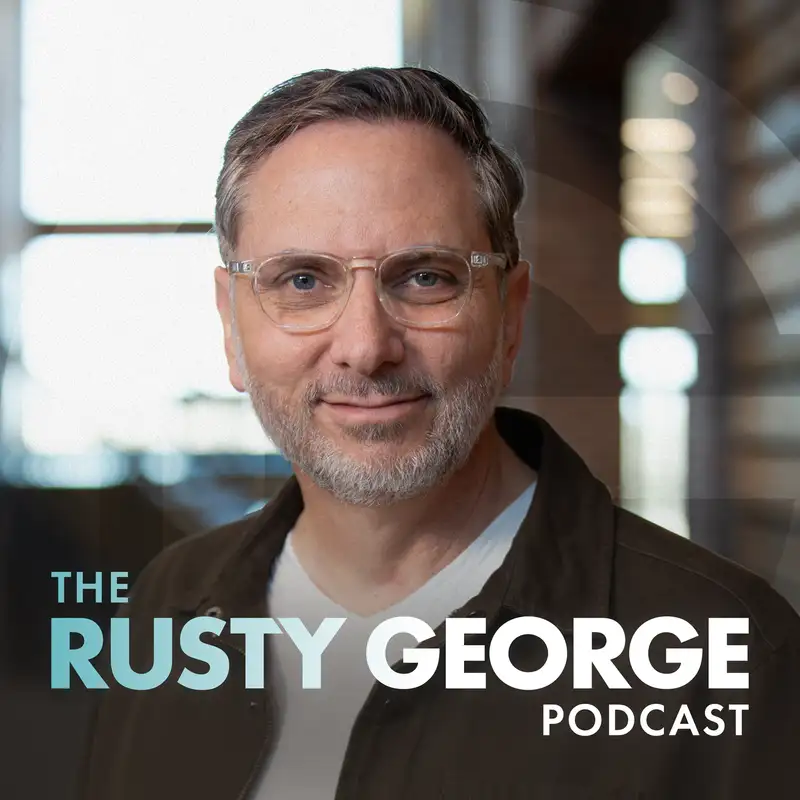Relational Apologetics: How Do I Answer Their Questions? - A Simple Faith Special Series
Following Jesus isn't always
easy, but it's not complicated.
Join us each week as we
work to make faith simple.
This is simple faith.
Welcome back everyone.
I'm Rusty George, and we are
on episode four of our journey
into relational apologetics.
If you've missed the previous three.
Stop right now and go back and
listen to those first three.
We've explored the power of connection,
the art of empathetic listening, the
importance of finding common ground.
Now we're tackling something that
can often feel like a roadblock
in conversations about faith
objections and difficult questions.
In our exploration of relational
apologetics, we've established
that building bridges of
understanding is paramount.
But even in the most carefully
constructed relationships, questions
and challenges will inevitably arise.
These objections, whether intellectual,
emotional, or experiential, are
not necessarily signs of rejection.
Instead, they can be viewed as
opportunities for deeper engagement and
a more nuanced understanding of faith.
Oh, that's so good because I think
sometimes when someone raises an
objection, our defenses immediately go up.
We feel like we need to have
all the answers right then and
there, and it can turn into an
argument instead of a conversation.
Exactly.
Think back to our clip with Greg
Coco, who emphasizes the importance
of using questions in conversation.
When someone presents an objection,
instead of immediately countering
it, we can respond with curiosity.
Instead of saying, well,
you're wrong about that.
Well, you could ask something like,
tell me more about why you feel that
way, or what makes you say that?
Yes, this approach aligns with hearing the
heart like we discussed in episode two.
Understanding the heart behind
the objection is super crucial.
Is it based on a misunderstanding,
a personal experience, or hurt, or
a genuine intellectual struggle?
You have to allow them to empty the
bucket, and you have to be able to
hear when they're ready to listen.
Then once that bucket is empty,
they can ask the question
that is truly on their heart.
That is your moment when you can help
guide them as a community toward the
answer that they are looking for.
You make it sound so simple, it
sounds like you're saying that
we don't have to be the expert.
But we do have to be prepared.
That's the difference between relational
apologetics and traditional apologetics.
You change the order from believe,
then belong to belong then believe.
In fact, it's very interesting.
The, one of the, the prayer of Jesus
to me that's the most fascinating
is when he's on the cross.
Hmm.
When you think about the, when you read
the, uh, the New Testament description
of the crucifixion in the original Greek
in which it's written, one of the things
you notice is that the imperfect tense
of the Greek suggests that Jesus did not
just say it once, but he kept praying
it over and over during all the torture
of the crucifixion, while the nails
were being driven through his hands.
While the nails were being driven through
his feet, he kept repeating over and over.
Father, forgive them.
Father.
Forgive them.
Father forgive them for they
don't know what they do.
So John Stotts, famous British pastor,
pointed out, he said, look, um, the, the
son of God prayed until his final gasps
on the cross for people so depraved,
they were torturing him to death.
And the implication is for those
of us who are followers of Jesus,
in light of that, how can we
justify not praying consistently
and fervently and expectantly?
For lost people in our lives.
That was a conversation with Lee Strobel,
and that is an especially convicting
thought because if we're truly inviting
our lost friends and loved ones into
community, then we'll naturally feel
the urgency to pray for them, and not
just for intellectual wisdom, but as
someone who knows the joy and hope of
salvation and desperately wants a loved
one, to experience that even as that
person is rejecting Jesus at that moment.
And as it just so happens, that's
how Jesus feels about them as well.
Mm mm.
Community not only means falling
in love and belonging, but comes
with the burden of heartbreak when
someone rejects that community.
I.
It's also important to recognize that
objections can come in different forms.
Sometimes they are intellectual
challenges to the logic or
evidence of Christian beliefs.
Other times they might be emotional
responses stemming from pain,
disappointment with the church or
perceived hypocrisy, and sometimes they
are practical concerns about how faith
intersects with real world issues.
Now, of course when I say what's the root
of it, that depends on how we define it.
But I think a few things, if we mean
deconstruction, somebody leaving
their faith, there's a few common
threads I often find, and by leaving
their faith, I mean either becoming a
Christian or the kind of progressive
Christian that rejects orthodoxy.
We find a few things in common.
Number one, very often
a fundamentalist strict.
Background in the church.
Not always, but often that is there.
Second, you find a lot of hurts.
Mm-hmm.
And pain of how people were treated.
And third, you often find no
room for questions and doubts.
Just believe or very
experiential kind of faith.
Mm-hmm.
I'm not, uh.
Rejecting or downplaying the importance of
the intellectual questions people raise.
We have to be ready with an answer,
but those threads are frequently
there when somebody is deconstructing.
So it's important.
I wanna get to the heart of the issue
for somebody and deal with it if I can.
That's so good It, I mean, it really
does come down to listing, doesn't it?
You just gotta ask several questions.
What is it you're deconstructing from?
What is it that you've
found to be inconsistent?
And I.
And I think, uh, Jim Wallace was
on this podcast and said the same
thing at the heart of it, usually
it is some kind of church hurt or
disappointment with God, uh, that
they, they don't know how to reconcile.
So they've, they've thrown it all out
and, uh, we intellectualize it, but at
the heart of it, it's some kind of pain.
Well, I think Jay, you mean
Jay Werner Wallace, right?
Yes, I do.
Is that as you refer to
I, I I think he got it.
That's often, often the case.
So disappointment can be, I.
Bad theology and expectations.
Mm-hmm.
And then when those expectations
aren't met, we reject this faulty view
of God that never in the first place
was what we should have expected.
Mm-hmm.
That's a piece of it.
So theology is important, but
I don't think we can downplay
the role that hurt plays.
Acknowledging the validity of those
different types of objections is key.
Someone who has experienced church
hurt, as Sean McDowell mentioned,
isn't going to be swayed by a purely
intellectual argument until their
emotional wounds are addressed.
That's right.
Our approach needs to be multifaceted,
recognizing the interplay between
the intellectual, emotional,
and relational aspects of faith.
When faced with a difficult
question or objection.
One helpful strategy as highlighted by Lee
Strobel is to make a personal connection.
Sharing a relevant personal story
or acknowledging a shared human
experience can build rapport and
create a less adversarial environment.
So this strategy of sharing
personal stories is.
Really very similar to Jesus's own
favorite strategy telling parables.
That's right.
It reminds me of the power of
personal testimony, which we
touched on in the last episode.
When you share your own journey,
your own doubts and how you've
wrestled with similar questions, I.
It can be incredibly relatable
and break down barriers.
Consider also the wisdom of
Greg Coco in his book tactics.
One more question, sir,
about those sax of gold.
He emphasizes the Colombo tactic,
asking clarifying questions to
understand the other person's
viewpoint before offering a response.
This is not only great detective
work, but it also ensures that you're
addressing the actual objection.
And it demonstrates that
you value their perspective.
I love that book, and I love that this
perspective actually buys you time.
It's okay not to have all
the answers immediately.
Saying something like, that's
a really interesting point.
Let me think about that for a minute.
Is much better than giving a rush or
inaccurate answer when dealing with
specific intellectual objections.
It's very helpful to be familiar
with common arguments and
evidence for the Christian faith.
This is why resources from apologists
like Jay Warner Wallace and Lee
Strobel can be invaluable here.
However, remember that the goal isn't
necessarily to win an argument, but
to guide someone to understanding
exactly, and sometimes the most powerful
response isn't a perfectly crafted
argument, but simply acknowledging
the difficulty of the question.
There are some things we may
not have complete answers
to on this side of eternity.
Showing humility and honesty in
those moments can be more impactful
than trying to force a resolution.
Not only that, but relational
apologetics reminds us that our
lives are a powerful form of witness.
As we consistently demonstrate love,
compassion, and integrity, we provide
a living answer to some of the most.
And biggest objections to faith?
Absolutely.
Our actions speak volumes if we're
claiming to follow Jesus, but our lives
are marked by judgment and negativity.
That creates a huge disconnect.
But there will also be times,
despite our best efforts, a
conversation reaches an impasse.
In these situations, it's crucial to
know when to step back respectfully.
Relational apologetics prioritizes the
relationship, and sometimes continuing to
press an issue can damage that connection.
That's a tough one, because we care
deeply about what we believe and we
want others to understand it too.
But forcing someone to believe
something they're not ready to accept.
Is pretty much never effective
and can be counterproductive to
building a lasting relationship.
Again, this is like the last supper
when Peter promised that he would
be willing to die for Christ, but as
we saw in a previous episode, he was
not yet ready to live for Christ.
Well, let's consider together,
think about a time you raised a
difficult question or objection about
something you weren't sure about.
What kind of response did
you find most helpful?
And for those of us who were sharing our
faith, how can we become more comfortable
with not having all the answers and
seeing objections as opportunities for
deeper connection rather than threats?
How can we make the mental shift
from being an expert to being a
host or guide, journeying with
someone to learn the truth together?
What are some practical ways we
can show respect and empathy?
When someone challenges our beliefs,
even if we strongly disagree with
their perspective, take some time
this week to reflect on that.
Think about how you typically respond
to objections and how you might approach
them differently moving forward.
All right.
Looking ahead to our final episode
in the series, let's consider this.
If relational apologetics
emphasizes a long-term approach
of building a relationship.
And fostering understanding and community.
What does it look like to persevere
in those relationships even when
there seems to be no immediate
change or acceptance of our beliefs?
That's a crucial question
we'll be exploring in our
final episode of the series.
It's about the long game
of relational faith.
Well, thanks for joining us today.
You can find more resources and
connect with us@pastorrustygeorge.com.
Make sure you share this
series with a friend.
But until next time, let's keep
exploring faith through connection
and remember to keep it simple.

